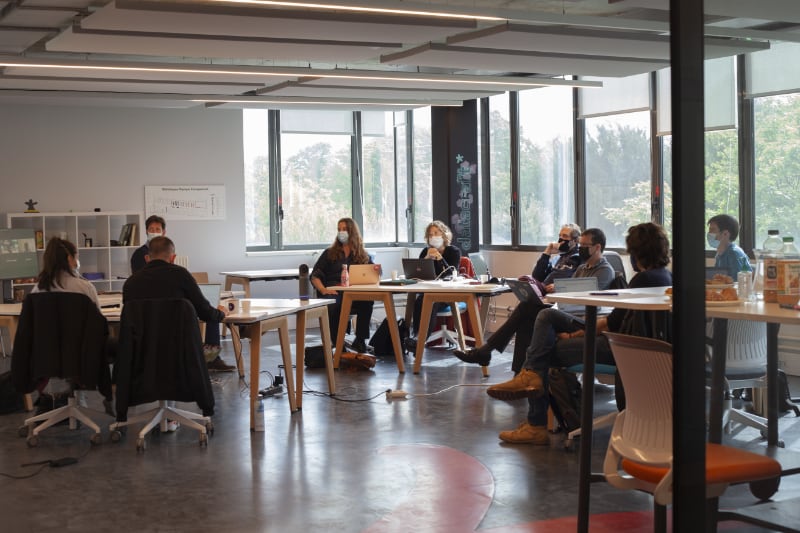Vision
In a national and international context of competition in artificial intelligence, SCAI brings together a strategic range of disciplines of modern artificial intelligence in the heart of Paris and in Sorbonne Université Abu Dhabi.
The SCAI is a structure of the Sorbonne University Alliance able to federate the communities of the three faculties of Arts & Humanities, Science & Engineering and Medicine of Sorbonne University, as well as members of the Sorbonne University Alliance (UTC, MNHN, INSEAD).

A double ambition in both research & education
Chairs of excellence
Interdisciplinary projects
Collaborative responses to scientific calls
Industrial partnerships
Funding opportunities
Doctoral programs
Scientific events
Innovative training programs
Locations
Paris
Our address
Esclangon building
1st floor
Campus Pierre et Marie Curie
4 place Jussieu
75005 Paris
Email us
The offices of SCAI in Paris are located in the Esclangon building on the Pierre and Marie Curie campus of Sorbonne University. This collaborative space allows us to host students, researchers and companies.
open the map
Abu Dhabi
Our address
SUAD Campus
Jazeerat Al Reem
Al Reem Island
Abu Dhabi - UAE
PO BOX 38044
Email us
In Abu Dhabi, the center is located in modern working spaces on the Sorbonne Abu Dhabi campus. This research space is dedicated to industrial research chairs and to initial and continuing education.
open the map
Computing Power
SCAI now operates a GPU computing cluster available to the whole community.
Management
Management Team
Coordinates and implements the centre's actions in liaison with the various stakeholders.
Gérard BIAU
Director of SCAI
Professor at Sorbonne Université
Gérard Biau is a Full Professor at the Probability, Statistics and Modelling Laboratory (LPSM) of Sorbonne University. His research is mainly focused in developing new methodologies and rigorous mathematical theories in statistical learning and AI, whilst trying to find connections between statistics and algorithms. He is currently the Director of SCAI.
Xavier FRESQUET
Deputy Director of SCAI
Research engineer at Sorbonne Université
After a PhD in musicology and digital humanities at Paris-Sorbonne, Xavier Fresquet joined UPMC, then Sorbonne University, in 2015 to support the development of the activities of the PLAS@PAR plasma physics laboratory of excellence. He has been accompanying the artificial intelligence community since 2019 within SCAI.
Nora ROGER
Administrative and Financial Manager
Scai - Paris
Recruited at the CNRS in 1991 as a manager, Nora Roger made several internal mobilities in different laboratories, including 7 years at LERMA. On February 1st 2021, she joined the Scai and ISCD teams as Administrative and Financial Manager (Sorbonne University).
Alain RABAUTE
SOUND.AI program manager
Associate Professor at ISTeP, Sorbonne Université
Alain Rabaute is Associate Professor of Marine Geology and Geophysics at the Geoscience Laboratory (ISTeP) of Sorbonne University since 2010, after 10 years as a research fellow at Ecole normale supérieure in Paris and IFPEN in Rueil-Malmaison. His research interests are the study of active tectonics and geodynamics of the Mediterranean region and associated geohazards (seismic, tsunami, landslides), and the use of multivariate statistics to investigate the physical properties of geological formations and their spatial variability (for underground energy such as hydrogen or geothermy, carbon and waste storage, mineral, oil and gas). He is also the founder and Managing Director of the R&D consultancy SME Geosubsight since 2006.
Baptiste GREGORUTTI
Research Engineer
Sorbonne Université
Baptiste Gregorutti is a data scientist assisting researchers at Sorbonne University in implementing machine learning tools across various domains, including medicine, biology, ecology, and digital humanities. Previously, he led data science teams in companies, focusing on tasks such as reducing fuel consumption in aviation, enhancing cybersecurity, implementing image segmentation algorithms, etc. Additionally, he contributes to executive and introductory training programs covering Python, data visualization, and introductory topics in data science and machine learning.
Christophe VAUTEY
Innovation Manager
SCAI & SATT LUTECH
Christophe Vautey is a PhD in materials science and an experienced R&D and innovation program manager. He has over 25 years of experience across materials, optics, electronics, IoT, AI and quantum technologies. He now focuses on building partnerships between companies, start-ups and research labs to turn new technologies into useful industrial solutions.
Clotilde CHEVET
Project Manager
Sorbonne Université
After a PhD in Information and Communication Sciences, Clotilde Chevet joined SCAI as Project Manager. She is working on the development of an AI-based teaching assistant, to facilitate English language learning in primary schools.
Dimitris ALCHATZIDIS
Project Manager
Sorbonne AI
Dimitris Alchatzidis is Project Manager for AI & Technological Innovation at the Sorbonne Cluster for Artificial Intelligence (SCAI), Sorbonne University. He leads the Sorbonne.AI initiative, fostering collaboration between academia, industry, and public institutions to advance AI research, education, and innovation. With a background bridging European affairs, innovation management, and AI ecosystems, Dimitris works at the intersection of technology, strategy, and international partnerships shaping the role of AI in higher education, creating opportunities for talent development, and building bridges between research and society.
Étienne GUÉVEL
Data Scientist
Sorbonne Université
Etienne Guével is a dedicated and innovative Data Scientist specializing in healthcare research. With a strong foundation in engineering acquired during his studies at Centralesupélec, Etienne honed his skills at the AP-HP (Assistance Publique - Hôpitaux de Paris). This experience provided him with a deep understanding of the complexities and challenges within healthcare, fueling his passion for data-driven solutions that improve patient outcomes.
Julie PERRIN
Communication officer
Scai - Paris
After working as Project Manager for the AI4IDF DIM, Julie joined the SCAI team as Communications Manager.
Julien ROUDIL
Operational manager of "Campus de métiers et des qualifications de l’Intelligence artificielle"
Sorbonne Université
After a diploma and a first experience as an engineer in physics/mechanics, Julien Roudil worked for more than twenty years in the development and management of training structures, initial and continuing professional, mainly in the industrial and new technologies. Today he is delighted to continue his commitment to the development of the campus of AI professions and qualifications, it is a true synthesis of the experiences and expertise that he has been able to develop so far.
Linghwei LOUBARESSE
Project Manager
SCAI - PostGenAI@Paris
Linghwei joined SCAI as Project Manager with experience in clinical research across both the pharmaceutical industry and hospital settings. Her varied background supports her contribution to the scientific, regulatory, and operational dimensions of the projects.
Marco SALAZAR
Education Manager Project SCAI
Sorbonne Université
Responsible for developing and managing innovative educational projects at Sorbonne University's SCAI, with a focus on designing and creating training modules on artificial intelligence. These courses, tailored to diverse audiences—undergraduate and postgraduate students, educators, and the general public involved in continuing education—aim to integrate cutting-edge AI technologies into educational frameworks. The mission also emphasizes fostering collaboration among educators and promoting lifelong learning initiatives.
Omar EL DAKKAK
Associate Professor in Mathematics in the Sciences and Engineering Department of Sorbonne University Abu Dhabi
SCAI Abu Dhabi
Omar El Dakkak is an Associate Professor in Mathematics in the Sciences and Engineering Department of Sorbonne University Abu Dhabi (SUAD). His Research interests lie at the intersection between Probability on Discrete Structures, Empirical Processes Theory and Nonparametric Statistics. He is currently SUAD’s Academic Advisor in Mathematics, Numerical Sciences and SCAI Affairs and the Programme Head of the Bachelor in Mathematics, specialization in Data Science for Artificial Intelligence.
Rakhee PATEL
General Secretary
Engineer studies at Sorbonne Université
Rakhee PATEL, with her scientific background, has been supporting UPMC and Sorbonne Université academics develop their international relations since 2009. In 2022 she joined the SCAI team to accompany the development of international and industrial partnerships.
Vivien CONTI
Data Scientist
SCAI
Vivien is part of the SCAI data science team and he implements data science and machine learning algorithms (Computer Vision, NLP) to support research across various fields.
Scientific Advisory Board
Discusses and proposes the Institute's major scientific orientations, validates the quality of ongoing projects, advises the SCAI Management and initiates new interdisciplinary or intersectoral directions.
Arianna MENCIASSI
Daniel ANDLER
Jacques CORBEIL
Joëlle BARRAL
Julie JOSSE
Executive Committee
Supervises the life of the Institute at the local level, the smooth running of projects, the scientific programme of events, and educational innovation. It supports the Management as much as necessary.
Andrea PINNA
Mathieu SALANNE
Paola CINNELA
Stakeholder Committee
Oversees the smooth running of the Institute within the Sorbonne University Alliance. It proposes short and medium term strategic orientations and ensures good communication within the community.
This committee is composed of a representative of each institution of the Sorbonne University Alliance, the deans of the three faculties of Sorbonne University, the directors of the doctoral schools, the directors of the departments concerned, the directors of the research units concerned. It meets at least once a year at the invitation of the Institute's Management team.













